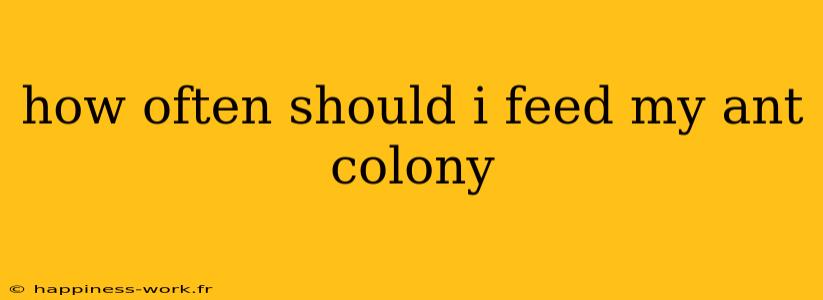Feeding an ant colony might seem straightforward, but it involves understanding the specific needs of the species you are raising and the dynamics within your colony. In this article, we explore the optimal feeding schedule for ant colonies, answer common questions, and provide tips for maintaining a healthy and thriving colony.
How Often Should I Feed My Ant Colony?
According to WikiHow, the frequency of feeding your ant colony depends on several factors:
- Ant Species: Different ant species have varying dietary needs. For example, Formica species might require more protein in their diet compared to Camponotus species.
- Colony Size: As your colony grows, so will its food requirements. Larger colonies might need to be fed more often than smaller ones.
- Life Stage: If your colony is in a growth phase or if there are larvae present, you may need to feed them more frequently to support development.
Answer: Generally, it's recommended to feed your ants every 2-3 days, but during rapid growth phases or when you notice high activity levels, consider adjusting to daily feedings.
What Should I Feed My Ant Colony?
When it comes to feeding, variety is key. According to WikiHow, some common food options for ant colonies include:
- Protein sources: Insect protein, egg yolks, or specialized ant protein diets.
- Carbohydrates: Sugar water, honey, or fruit.
- Fats: Occasionally, you can provide small amounts of fatty foods.
Additional Insights:
While these suggestions provide a solid foundation, understanding how your ant colony reacts to specific foods can help tailor their diet further. For instance, if you notice your ants responding positively to fruit, it may be worth incorporating this into their regular diet.
How Can I Tell If My Ants Are Hungry?
Observing the behavior of your ants can reveal a lot about their hunger levels. Some signs include:
- Increased Foraging: If ants are frequently leaving the nest, it could mean they are searching for food.
- Aggressive Behavior: During feeding times, ants may exhibit aggressive behavior towards other colonies if food is scarce.
Practical Examples:
- Colony Growth: If you start a new colony and notice they are quickly consuming food within a few hours, this might indicate they are in a growth phase and require more frequent feedings.
- Winter Months: Ants may enter a hibernation or dormancy period during colder months, resulting in decreased feeding needs. During this time, it's advisable to reduce food availability.
Conclusion
Feeding your ant colony requires attention to detail, observation, and understanding of your specific species’ needs. Remember to adjust your feeding regimen based on the size, species, and life stage of your colony. By maintaining a balanced diet rich in protein, carbohydrates, and occasional fats, you can ensure a healthy environment that promotes growth and activity.
Additional Considerations
While frequency and diet are essential, do not forget about cleanliness. Remove any uneaten food after 24 hours to avoid mold and pests that could harm your colony.
For more detailed instructions and feeding tips, you can refer to the original article on WikiHow. Happy ant-keeping!
This article offers a comprehensive guide for feeding ant colonies, not only summarizing key points from WikiHow but also providing deeper insights, practical examples, and additional considerations.
